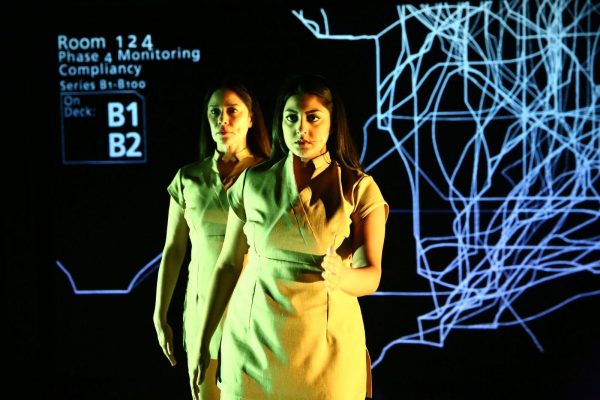
Mariana Newhard and Lipica Shah in Assembled Identity. Photo: Paula Court
Assembled Identity is a marvelous piece of craft, using all the tools of modern theater in supple and inventive ways: David Bengall’s stunning projection design limns the set, fills scene transitions with genuinely creepy backdrops that also contain crucial narrative information, and provides elegant visual accompaniment to (otherwise somewhat purposeless) musical numbers. Christina Tang’s lighting complements Bengall’s work to define the spaces in which characters are permitted to operate. Drew Weinstein’s sound design is precise and elegant (he also composed the original music). Mariana Newhard and Lipica Shah both give performances of striking breadth, each playing multiple characters speaking multiple languages (twelve translators and five dialogue coaches are credited in the program). Director/co-creator Kristin Marting integrates found text with original story smoothly, and has done strong work with the actors, giving them similar habits and ways of moving that maximize their ability to pass for twins. But while the ideas underlying the piece–about identity, ethnicity and ethnic ambiguity, twinning and cloning and the perfectibility of the human race–are intriguing and important, I often found myself wishing the complexity and richness of the text and the characters lived up to the excellence of the production.
Drawing on sources that include philosopher/historian Walter Benjamin, Caryl Churchill’s cloning play A Number, science fiction writer Ursula K. Le Guin, anthropologist Franz Boas, and many others, the piece integrates found text with its own storyline about human identity. Adopted identical twin sisters (the never-named subjects A1 and A2), have come to the Centers for Disease Control for a battery of genetic and other tests which they hope will provide information on their genetic history to inform the treatment of the never-specified “condition” that one of the sisters (Newhard) has suffered from, almost fatally. As they proceed through their test battery, they, and the audience, slowly learn that they’re part of a cohort of clones: others from all over the world, who are as identical to them as looking in a mirror, also receiving the same tests.
The glimpses we get into the stories of those women, told in many languages–I noted Spanish, German, Arabic, Bengali, and Tagalog–and fraught with their anxieties about immigration status, about being in what feels like custody, about their own histories, and for many of them about their own twins, many of whom died from the same “condition” that afflicts A1 and A2, are the most effective parts of the piece. (The characters A1 and A2 by comparison feel so representative and archetypal that they become generic; they feel at times almost purely vehicles for exposition and information, like the non-characters in instructional videos.) But quickly–the piece is under an hour–the discovery that they have, or are, clones (and all the issues and complications about identity and personhood that, for example, the recent BBC show Orphan Black took five seasons of television to explore) gets subsumed by two more shocking pieces of knowledge: First, there’s another generation of clones, raised fully to physical adulthood in the lab (it seems, anyway, unlike the A generation, who were raised in from at least early childhood in families) waiting to have personalities and memories embedded. And second, that the whole project is quite explicitly based in eugenics, which A1 and A2 discover, process, and react differently to in a compressed blip of time.
There’s so much thought-provoking stuff here that’s only glanced over: The stories of the other clones, for one thing, and the ways in which the lives of the different clones have been colored by the culture they were raised in and the ethnic or racial background they are presumed both by themselves and by others to have. The relationship of blood-related twins raised together by an adoptive family, juxtaposed with blood-related twins who are total strangers. The way the second-generation clones, lab-raised, interact with the culture-raised twins (there is one brief scene between A2 and a B clone who “imprints” on her, absorbing her memories and her personality in a way that is at first charming and then rapidly creepy, but the entire arc plays out in just a few moments). The way all the different clones react to discovering the true nature of the project, especially those whose immigration status depends on being part of it. (A1 and A2 immediately develop opposed responses and then part ways.) The fascinating moments when Marting and the actors engage with the illusion of the casting–unrelated actors playing a series of identical clones, and playing on the audiences’ assumptions about the backgrounds and relationships of “ethnically indeterminate” actors.
I might vote here for cutting out the songs (which don’t add much; the details of the science aren’t developed enough to make sense when conveyed musically and the songs feel like interruptions every time) to give a little more time to both generations of clones. It’s rare that I wish for a show to be longer, but I felt like Assembled Identity only scratched the surface–it did so with consummate craft, but not quite enough humanity.
